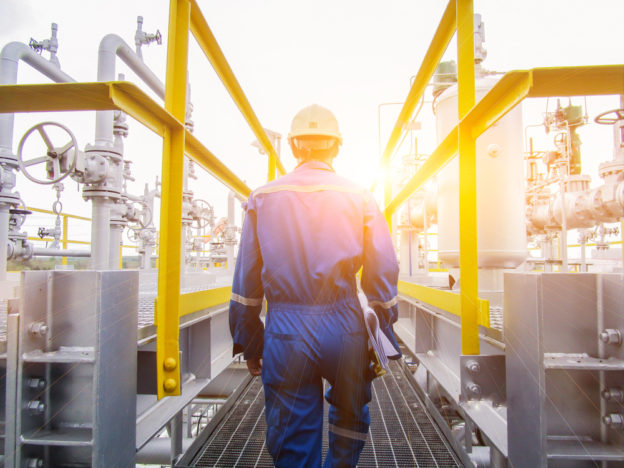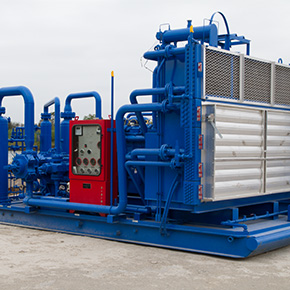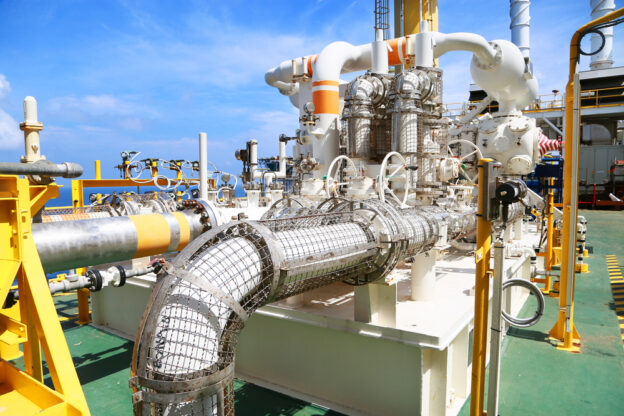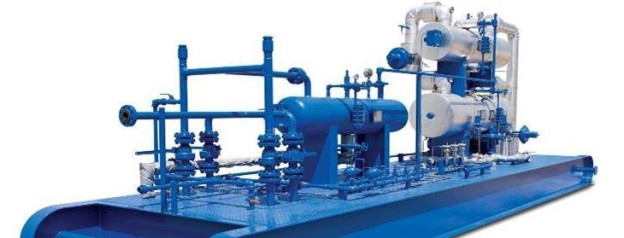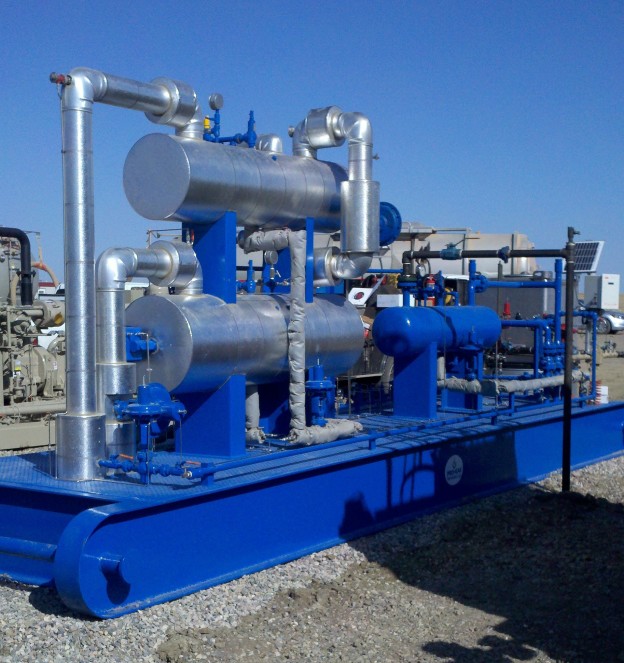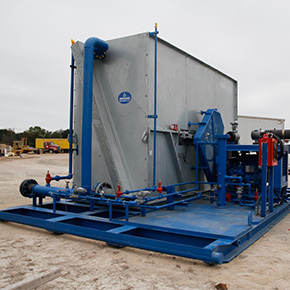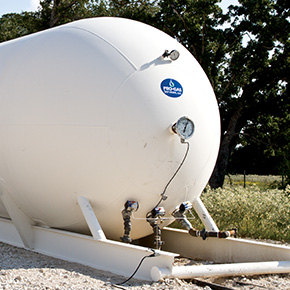Oil and gas is a complex landscape of processes, each playing a crucial role in ensuring the safe and efficient delivery of energy resources to homes and businesses worldwide. While drilling and extraction often take the spotlight, the journey of natural gas from wellhead to consumer involves a series of intricate steps, each designed to optimize quality and safety. One critical, yet often overlooked, component in this journey is the field gas conditioner, also known as a JT skid.
These compact, powerful systems act as unsung heroes, diligently working behind the scenes to ensure natural gas is primed for transportation and further processing. Join us as we delve deep into the world of field gas conditioners, exploring their functions, benefits, and the crucial role they play in the oil and gas value chain.
What is a Field Gas Conditioner? What Is a JT Skid?
Imagine a miniature processing plant, strategically positioned at the wellhead or a gas gathering point. That’s essentially what a field gas conditioner, or JT skid, is. This self-contained system is specifically engineered to process raw natural gas, removing impurities and liquids to ensure it meets stringent quality standards for pipeline transportation or further processing.
The name “JT skid” is derived from the Joule-Thomson effect, a fascinating thermodynamic principle that underpins the system’s operation. This effect describes how the temperature of a gas changes when it expands without doing any external work. In a JT skid, this principle is harnessed to cool and condense the gas, facilitating the separation of liquids and impurities.
These skids are typically designed as modular units, making them easily transportable and installable in remote or challenging environments, from onshore well sites to offshore platforms. This flexibility makes them invaluable in today’s diverse oil and gas production landscape.
Why are Field Gas Conditioners Essential?
Field gas conditioners serve a multitude of critical purposes in the oil and gas industry, acting as guardians of quality, efficiency, and safety:
Dew Point Control
Natural gas, as it emerges from the well, often carries with it water vapor and heavier hydrocarbons. These components have a tendency to condense as the gas cools during transportation, forming liquids that can wreak havoc on pipelines and downstream equipment.
Field gas conditioners act as the first line of defense against this issue. By precisely controlling the temperature and pressure of the gas, they effectively lower its dew point – the temperature at which condensation occurs. This ensures the gas remains in a gaseous state throughout its journey, preventing corrosion, hydrate formation, and other operational challenges.
Hydrocarbon Recovery
Natural gas isn’t just methane; it’s a complex mixture of hydrocarbons, some more valuable than others. Heavier hydrocarbons, often referred to as condensate, are liquids that can be extracted and sold separately, adding another revenue stream for producers.
Field gas conditioners, with their sophisticated separation capabilities, effectively recover these valuable condensates from the gas stream, maximizing resource utilization and boosting profitability.
Impurity Removal
Raw natural gas often contains unwanted guests – impurities like carbon dioxide (CO2), hydrogen sulfide (H2S), and water. These impurities can corrode pipelines, damage processing equipment, and even pose safety and environmental risks.
Field gas conditioners act as diligent purifiers, removing these contaminants to safeguard infrastructure, ensure the quality of the gas, and minimize environmental impact.
Slug Control
Imagine a sudden surge of liquids rushing through a pipeline, potentially causing damage and disrupting operations. These surges, known as slugs, are a common challenge in gas production. Field gas conditioners play a crucial role in preventing slug formation by effectively separating liquids at the wellhead, ensuring a smooth and consistent flow of gas through the pipeline.
Environmental Protection
Environmental stewardship is a paramount concern in today’s energy landscape. Field gas conditioners contribute to this effort by removing harmful impurities, preventing leaks, and minimizing emissions. By ensuring the safe and efficient processing of natural gas, they help reduce the industry’s environmental footprint.
Components of a Field Gas Conditioner/JT Skid
A typical field gas conditioner is a marvel of engineering, comprising several key components working in harmony:
Inlet Separator
The journey begins with the inlet separator, a vessel designed to separate any free liquids that may be present in the incoming gas stream. This initial separation stage ensures smoother operation of downstream components.
Heater
To prevent the formation of hydrates — ice-like structures that can block pipelines — the gas is heated to a specific temperature. This heating process also improves the efficiency of the subsequent separation stages.
Joule-Thomson Valve
This is where the magic of the Joule-Thomson effect comes into play. The valve precisely controls the pressure drop of the gas, causing it to cool rapidly and condense. This cooling and condensation process is the heart of the JT skid, facilitating the separation of liquids and impurities.
Low-Temperature Separator
Once the gas is cooled and condensed, the low-temperature separator takes over. This vessel efficiently separates the condensed liquids (water and condensate) from the cooled gas stream.
Glycol Dehydration Unit
To achieve the desired dryness for pipeline transportation, any remaining water vapor in the gas stream is removed using a glycol dehydration unit. This unit utilizes a hygroscopic solution (glycol) to absorb water vapor, ensuring the gas meets stringent dryness specifications.
Instrumentation and Controls
Sophisticated instrumentation and control systems act as the brain of the JT skid, continuously monitoring and controlling process parameters like temperature, pressure, and flow rate. This ensures optimal performance, safety, and efficiency.
Benefits of Using Field Gas Conditioners/JT Skids
The use of field gas conditioners offers a multitude of benefits to oil and gas producers, impacting everything from production efficiency to environmental performance:
Increased Production Efficiency
By conditioning the gas directly at the wellhead, JT skids reduce backpressure on the well, allowing for higher production rates and maximizing the recovery of valuable resources. This translates to increased revenue and improved operational efficiency.
Improved Gas Quality
Removing impurities and liquids ensures the gas meets stringent pipeline specifications and quality standards. This not only prevents operational issues but also enhances the value of the gas, making it more marketable.
Reduced Operating Costs
Preventing corrosion, hydrate formation, and equipment damage translates to significant cost savings in the long run. Reduced maintenance, repair, and downtime contribute to a healthier bottom line.
Enhanced Safety
By removing harmful impurities like H2S and preventing leaks, JT skids contribute to a safer working environment for personnel and minimize the risk of accidents.
Environmental Protection
Minimizing emissions, preventing spills, and ensuring responsible resource management are crucial aspects of sustainable oil and gas production. Field gas conditioners play a vital role in achieving these environmental goals.
Applications of Field Gas Conditioners or JT Skids
Field gas conditioners are versatile systems, finding applications across a wide range of oil and gas operations:
Wellhead Gas Processing
Conditioning gas directly at the wellhead is crucial for preparing it for pipeline transportation or further processing at downstream facilities. JT skids provide a compact and efficient solution for this critical step.
Gas Gathering Systems
In gas gathering systems, where production from multiple wells is collected and transported, JT skids act as central processing hubs, ensuring the quality and consistency of the gas stream.
Gas Lift Operations
Gas lift is a technique used to enhance oil production by injecting gas into the wellbore. JT skids provide a reliable source of clean, dry gas for this process, optimizing its efficiency.
Offshore Platforms
Space and weight constraints are critical considerations in offshore oil and gas production. Compact and modular JT skids offer an ideal solution for conditioning gas in these challenging environments.
Choosing the Right Field Gas Conditioner or JT Skid
Selecting the most appropriate JT skid for a specific application requires careful consideration of several factors:
- Gas composition and flow rate: The specific composition of the natural gas (e.g., methane, ethane, propane content) and the expected flow rate significantly influence the design and sizing of the JT skid.
- Operating pressure and temperature: The pressure and temperature conditions at the wellhead or gathering point are crucial parameters in determining the appropriate equipment specifications.
- Dew point requirements: The required dew point of the processed gas, typically dictated by pipeline specifications or downstream processing requirements, will influence the design of the cooling and dehydration systems within the JT skid.
- Impurity levels: The concentration of impurities like CO2 and H2S in the raw gas will dictate the type and capacity of the purification systems required.
- Environmental conditions: Environmental factors, such as ambient temperature, humidity, and the presence of corrosive elements, need to be considered when selecting materials and designing the skid for long-term durability.
- Space and weight limitations: In certain applications, particularly offshore platforms or remote locations, space and weight restrictions may influence the design and selection of the JT skid.
Ready to Optimize Your Gas Production and Unlock Maximum Value?
Working closely with experienced engineers and equipment suppliers is essential to ensure the selected JT skid is perfectly tailored to your specific needs and operating conditions.
Field gas conditioners, or JT skids, are indispensable components in the oil and gas industry, playing a vital role in optimizing production, ensuring gas quality, and protecting valuable infrastructure. By understanding their functions, benefits, and applications, producers can make informed decisions to enhance their operations, maximize efficiency, and contribute to a more sustainable energy future.
Pro-Gas LLC is your trusted partner in natural gas processing solutions. We specialize in designing, engineering, and delivering high-performance field gas conditioners (JT skids) tailored to your specific needs.
Our expertise includes:
- Custom-engineered JT skid design and fabrication
- Dew point control and hydrate inhibition solutions
- Hydrocarbon recovery and condensate stabilization
- Impurity removal and gas quality enhancement
- Slug control and pipeline flow assurance
- Instrumentation and control systems integration
- On-site installation, commissioning, and support
Partner with Pro-Gas LLC to:
- Increase production efficiency and maximize recovery
- Improve gas quality and meet pipeline specifications
- Reduce operating costs and minimize downtime
- Enhance safety and protect your valuable assets
- Minimize environmental impact and promote sustainability
Contact us today for a free consultation and let our experts help you optimize your gas processing operations.
FAQ
What is a field gas conditioner/JT skid?
A field gas conditioner, or JT skid, is a compact, self-contained system used to process natural gas at the wellhead or gathering point. It removes impurities and liquids, ensuring the gas meets pipeline specifications and quality standards.
Why are field gas conditioners important?
Field gas conditioners are crucial for a variety of reasons, including:
- Dew point control: Preventing condensation and ensuring smooth pipeline transportation.
- Hydrocarbon recovery: Maximizing resource recovery by separating valuable condensate.
- Impurity removal: Protecting infrastructure and ensuring gas quality by removing contaminants.
- Slug control: Preventing slug formation and ensuring consistent gas flow.
- Environmental protection: Minimizing emissions and contributing to environmental stewardship.
What are the benefits of using a JT skid?
The benefits of using a JT skid are numerous and include:
- Increased production efficiency: Reducing backpressure on the well and increasing production rates.
- Improved gas quality: Ensuring the gas meets pipeline specifications and quality standards.
- Reduced operating costs: Preventing corrosion and equipment damage, minimizing maintenance and repair costs.
- Enhanced safety: Removing harmful impurities and preventing leaks, creating a safer working environment.
- Environmental protection: Minimizing emissions and preventing spills, contributing to environmental protection.
How do I choose the right field gas conditioner?
Choosing the right field gas conditioner involves considering several factors, including:
- Gas composition and flow rate
- Operating pressure and temperature
- Space and weight limitations
Working with experienced engineers and equipment suppliers is crucial to ensure the selected JT skid meets your specific needs and operating conditions.


